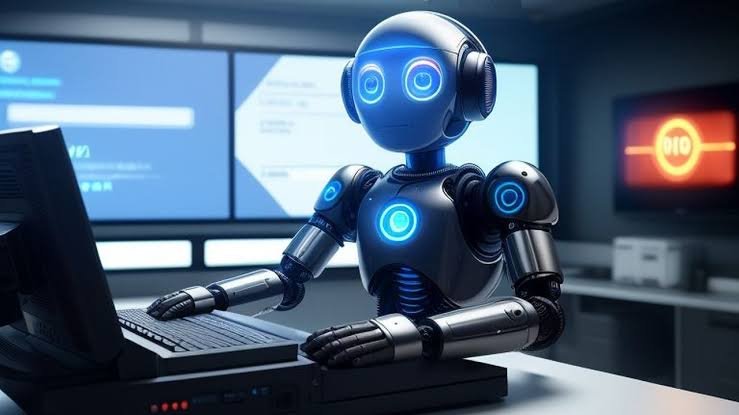Technology
From Robots to Chatbots: The Diverse Applications of AI and Where They’re Headed
Artificial intelligence (AI) technology constantly evolves, increasing demand for AI experts chatbots.

Artificial intelligence (AI) technology constantly evolves, increasing demand for AI experts. Large IT companies have released outstanding AI learning resources to help bridge the knowledge gap.
It will be worthwhile to invest the time to master this material, whether your goal is to further your knowledge in a specific AI-related field or you just want to grasp better where we’ve come from and where we’re going. You can benefit from a flexible schedule and finish an artificial intelligence course online on your schedule.
How does AI work?
AI can be divided into three primary categories:
- Knowledge engineering: This is AI’s initial and most crucial component. Only with sufficient data and access to items, relations, and attributes to enable knowledge engineering can the robots behave in a manner akin to that of human beings.
- Machine Learning: Machine learning is an intriguing area of artificial intelligence that deals with unsupervised learning. The computer can follow movements, patterns, indications, habits, and other significant details using sophisticated software and algorithms to produce particular actions or outputs.
- Machine perception involves the machine using sensory inputs to record and examine different environmental elements. These are primarily useful for facial gestures and even facial identification.
Major areas for application of Artificial Intelligence
The area of artificial intelligence is expanding quickly and has impacted numerous sectors. AI is used by both businesses and individuals to carry out monotonous activities, analyze data, and enhance other applications. Get an all-around understanding of Generative AI and machine learning with dedicated courses offered by Great Learning designed to build your career around Artificial intelligence.
These are just a few ways artificial intelligence is used to develop technology.
- Education
Despite being the industry most impacted by people, artificial intelligence is also gradually entering the education sector. Even in the education industry, faculty productivity has increased due to the gradual adoption of artificial intelligence, allowing them to focus more on teaching than office or administrative tasks. These are a few of the uses in this field:
- Automated Administrative Processes to Support Teachers: Artificial intelligence can assist educators with non-educational tasks such as managing enrollment, courses, and HR-related matters; task-related responsibilities such as facilitating and automating personalized messages to students; back-office tasks such as grading paperwork; organizing and facilitating parent and guardian interactions; and routine issue feedback facilitating.
- Producing Astute Content: Artificial Intelligence can be used to create digital versions of textbook aids, conferences, and video lectures. We can customize various interfaces, such as animations and educational materials, for students in various grade levels. AI is frequently utilized to enable automation in repetitive, data-intensive operations such as:
- Assigning grades for homework
- Setting up meetings
- Overseeing several online courses concurrently
- Personalized messages being sent to pupils
- Making or digitizing study materials and lectures
Once more, chatbot-style AIs appear; this time, they do so to promptly respond to common inquiries and free up teachers’ time for more difficult assignments.
- E-Commerce
Artificial intelligence technology makes Recommendation engines possible, which helps you interact more effectively with your clients. Their surfing history, tastes, and interests are all considered while producing these recommendations. It strengthens the link between you and your customers and promotes their loyalty to your business.
Fake reviews and credit card fraud are two of the biggest problems e-commerce businesses face. Artificial Intelligence can lessen the likelihood of credit card fraud by considering usage trends. Based on client feedback, many buyers purchase a good or service. AI is capable of recognizing and managing phony reviews.
- Healthcare
Artificial intelligence has also entered the medical industry as its accuracy has increased. Less excitingly, AI assists administrators with data processing, scheduling, file organization, and medical note transcription.
Consider how robots use AI to automate surgery for additional striking examples of how AI is used. Machine-led surgeries may operate around the clock, are less intrusive and more exact, and have a lower margin of error.
Through wearable technology to track health and identify issues before people become aware of them, AI can help with medical diagnosis. Some programs have also used AI to read body scans (such as MRIs) and find dangerous growths more quickly and accurately.
AI is even being used by pharmaceutical businesses to evaluate current and historical data to find new possible medications.
- Robotics
Another area where applications of artificial intelligence are frequently applied is robotics. Artificial intelligence (AI)-powered robots employ real-time updates to detect obstructions in their path and instantaneously plan their route. It applies to:
- Transporting supplies in factories, hospitals, and warehouses,
- Sanitizing huge machinery and offices,
- Inventory control.
Modern AI-powered robots are limited in their ability to “think” and solve issues. Consequently, ever more complex jobs are given to artificial intelligence. AI in robotics has several applications, from working on Tesla assembly lines to teaching English to Japanese students.
- Marketing
Artificial intelligence (AI) applications are also common in the marketing industry.
With AI, marketers may provide highly customized and targeted advertisements using behavioral analysis, machine learning pattern identification, etc. To achieve better outcomes and lessen sentiments of mistrust and frustration, it also aids in retargeting viewers at the appropriate times.
AI can support content marketing in a way consistent with the business’s voice and style. Routine duties like campaign reports and performance management can be handled by it, among many other things.
Great Learning offers online artificial intelligence courses from industry experts who are willing to make artificial intelligence more accessible to you. You will learn about the core ideas and methods of generative AI, a discipline renowned for originality and inventiveness, through live sessions at Great Learning.
Conclusion
We inevitably find new applications for artificial intelligence that enhance our lives as its use cases expand. The market for AI software is predicted to grow rapidly, with a projected value of $22.6 billion by 2025. The dynamic evolution from robots to chatbots exemplifies the versatile applications of AI, showcasing its ability to revolutionize various industries. As AI continues to advance, the future promises even greater strides, with innovations poised to redefine the way we interact with technology and enhance our daily lives.
Table of Contents
-

 Business5 months ago
Business5 months agoSepatuindonesia.com | Best Online Store in Indonesia
-

 Technology3 weeks ago
Technology3 weeks agoTop High Paying Affiliate Programs
-

 Tech5 months ago
Tech5 months agoAutomating Your Window Treatments: The Advantages of Auto Blinds
-

 Tech5 months ago
Tech5 months agoUnleash Your Potential: How Mecha Headsets Improve Productivity and Focus
-

 Instagram2 years ago
Instagram2 years agoFree Instagram Follower Without Login
-

 Reviews11 months ago
Reviews11 months agoAndroid Laptop vs. Chromebook: Which one is better?
-

 Instagram2 years ago
Instagram2 years agoIGTOK – Get Instagram Followers, Likes & Comments
-

 Business8 months ago
Business8 months agoFollow These 5 Tips To Avail Personal Loans At Lower Interest Rates




















